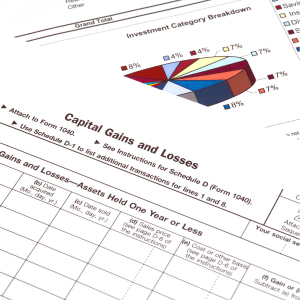
Effective Strategies for Minimizing Capital Gains Tax in Texas
How Does Deferring Tax Help in Reducing Capital Gains?
One great approach to controlling tax obligations is to postpone capital gains tax. Tax deferral techniques can significantly affect financial planning in Texas by delaying when taxes are paid. This strategy can help cash flow and maybe lower future tax loads. Those who keep investments for longer than a year qualify for reduced long-term capital gains tax rates compared to short-term rates.
These tactics assist those trying to avoid paying immediate capital gains tax. Knowing the tax consequences and using correct tax techniques might result in better financial results in Texas.
What Are the Benefits of a 1031 Exchange?
Real estate investors who aim to avoid capital gains tax would find significant advantages from a 1031 exchange, also known as a tax-deferred exchange. It lets investors sell a house and reinvest the earnings into another property without instant tax obligation. Through a 1031 exchange, investors can defer taxes and improve their investment portfolio using capital gains tax tactics applied in Texas.
For those engaged in a Real Estate Investment Trust (REIT), implementing a 1031 exchange can also help to enable ongoing investment development free from immediate tax impact. This approach allows continuous real estate investment fit with long-term financial objectives.
Is Selling Your Primary Residence Tax-Free in Texas?
Selling your main house gives Texas capital gains tax advantages. The main house exception lets homeowners avoid taxes up to $250,000 ($500,000 for married couples). Homeowners preparing a tax-free property sale would find this capital gains exclusion advantageous.
The homestead exemption helps Texas citizens lower their tax obligations; knowing these exemption rules and timing your sale will help optimize financial gains during a real estate transaction.
Can Home Improvements Affect Your Tax Obligations?
Home renovations affect tax responsibilities when selling property. Some modifications might raise the cost basis of a house, lowering the capital gains tax upon sale. Homeowners can reduce taxable gains by recording home improvement-related expenses and utilizing property tax deductions.
One must understand property sales tax laws and their consequences. Appropriately controlled house renovations can lower total tax obligations at sale.
The Role of Estate Planning in Capital Gains Tax Management
How Can Trusts Be Utilized to Mitigate Taxes?

Trusts are quite useful in estate planning because they provide ways to lower capital gains taxes. By using a trust fund property sale, people can control assets to reduce tax liability. A trust can also protect real estate and improve estate planning, reducing capital gains taxes at sale.
Including trusts in estate planning techniques provides Texans with a simple approach to handling tax issues and guarantees wealth preservation for future generations.
What is a Step-Up in Basis, and How Does It Work?
A good capital gains tax strategy that lowers inherited real estate tax obligations is the step-up in basis. When inherited, the basis of the property is “stepped up” to its current market value, therefore reducing the capital gains tax should a rapid sale be sought.
Knowing this section of Texas property tax rules helps control inheritance tax real estate issues. By means of a step-up in basis, heirs can avoid heavy taxes, safeguarding wealth and simplifying asset transfer.
Are There Specific Estate Planning Tools to Consider?
Many options in estate planning can help lower capital gains tax obligations. These cover trusts, family-limited partnerships, and other techniques for handling real estate assets. Those who concentrate on capital gains reinvestment and investigate real estate tax avoidance strategies can help shield their estates from significant taxation.
Good ways to safeguard and increase your assets are guaranteed by thorough estate planning. Expert help can offer customized guidance that fits your financial circumstances.
Impact of Residency Status on Capital Gains Taxation

Anyone selling real estate in Texas must know how residency status influences capital gains taxes. This section details how residency affects taxes and provides strategies for besting one’s tax obligations.
How Does Moving Out of State Affect Tax Liabilities?
You should evaluate changes in your tax status when you move out of Texas, particularly concerning capital gains tax. Moving can affect whether you need to pay taxes in Texas or your new state:
- Avoid Capital Gains Tax: There are strategies to reduce or avoid paying capital gains tax on property when relocating. Exploring these options can save money.
- Texas Real Estate: Depending on specific conditions, property owned in Texas might still have tax implications even after moving.
- Tax Implications: Each state has different tax rules; knowing them helps manage extra financial burdens after moving.
Is There a Difference for Non-Residents Selling Property in Texas?
Texas non-residents selling real estate have distinct issues from those of natives. Key points include:
- Capital Gains Tax: Non-residents usually face federal capital gains taxes but not state-level capital gains taxes in Texas because there is no state income tax.
- Residency Status: Confirming your residency status is necessary to determine your tax obligations under Texas property tax laws.
- Texas Property Tax Laws: While Texas doesn’t charge capital gains tax at the state level, non-residents should consult a tax professional for federal compliance.
What Are the Residency Requirements for Tax Benefits?
Establishing residency in Texas can offer various tax benefits:
- Residency Requirements: Meeting specific criteria can help avoid paying taxes on Texas property. Generally, you must establish Texas as your main home.
- Homestead Exemption Texas: To qualify for this exemption, you must meet residency requirements, which can lead to significant property tax savings.
- Primary Residence Sale: Selling a primary residence in Texas may qualify for IRS capital gains exclusions if specific criteria are met.
Analyzing Long-Term vs. Short-Term Capital Gains

Understanding the distinction between long-term and short-term capital gains is critical for investors since it impacts tax rates and tactics.
How Is the Holding Period Calculated?
Calculating the holding period of an investment is vital for tax purposes:
- Long-Term vs. Short-Term: Investments held for over a year are considered long-term, often resulting in lower taxes than short-term gains.
- Avoid Paying Capital Gains Tax: Holding investments for over a year can strategically reduce tax liabilities.
- Property Tax Strategies: Knowing the impact of holding periods can lead to better tax outcomes for Texas investment properties.
What Are the Tax Implications of Different Holding Periods?
The length of time you hold an asset before selling plays a significant role in taxes:
- Tax Implications: Long-term gains usually have more favorable tax rates, unlike short-term gains, which are taxed at regular income rates.
- Holding Periods: Planning when you sell an asset can significantly affect the tax owed.
- Texas Property Taxes: Holding periods also matter for property investments and improve tax planning.
Are There Strategies to Transition Gains from Short-Term to Long-Term?
Switching from short-term to long-term gains can be beneficial for taxes:
- Transition Gains: Aligning investment plans to turn short-term holdings into long-term ones can lower tax liabilities.
- Tax Strategies Texas: Using specific investment strategies can make this change easier and ensure that real estate tax strategies for Texas investors are followed.
- Capital Gains Tax Solutions: A focused plan helps maximize long-term capital gains, increasing returns while reducing taxes.
Consult a professional advisor for expert assistance on capital gains tax management based on residency status or investment strategy. Their counsel can help you understand complex legislation and make better financial decisions.
Influence of Federal Tax Policies on Texas Real Estate Investments
How Do Federal Capital Gains Tax Rates Impact State Decisions?

Including in Texas, federal capital gains tax rates significantly affect the decisions made by investors on how they engage in the real estate market. These rates can substantially affect state income since high federal taxes might inspire investors to follow more cautious plans. This can influence the volume and kind of transactions occurring in the Texas real estate market. Planning their investments requires investors to consider these federal rates since they directly influence decisions and results at the state level.
What Changes in Federal Policy Could Affect Texas Investors?
Texas investors should remain vigilant regarding changes in federal policies that can affect real estate taxes. Any changes in IRS capital gains tax laws or new legislation can influence investment results. Investors should be informed since these developments might bring new possibilities or demands. Understanding these policies helps investors safeguard their interests in the real estate market and prepare for changes.
How Does Federal Legislation Align with Texas State Laws?
Stable investments depend on investors knowing how federal laws complement Texas state laws. While federal rules set general guidelines, Texas laws can give local investors capital gains tax breaks and property tax exemptions. This alignment enables investors to enjoy these legal benefits while following all rules. This guarantees that investors respect federal and state rules as well as properly handle their taxes.
Utilizing Tax Credits and Deductions to Your Advantage
What Real Estate Tax Credits Are Available for Texans?

Texas property tax rules provide many real estate tax incentives for Texans. These credits support historic preservation and energy efficiency enhancements, among other things. By employing these credits, Texans can cut their taxable income and increase the appeal of their assets. Maximizing tax benefits and increasing investment returns depend on an awareness of these credit choices.
How Do Property Tax Deductions Work?
Property tax deductions reduce some linked expenses, therefore helping property owners lessen their taxable income. Included here are operating expenses, property taxes, and mortgage interest. These deductions can strengthen net earnings and change tax plans. Knowing the deduction process helps investors change the cost basis of their real estate and raise their profitability.
Are There Limits to How Much Can Be Deducted Annually?
Indeed, investors should be advised of regulatory restrictions on yearly deductions. Good Texas tax preparation depends on an awareness of these constraints. Although programs for property tax relief give some flexibility, investors must be aware of these limitations to stay compliant. Smart deduction planning allows investors to maximize relief without going beyond regulatory restrictions.
Selling Rental Properties: Tax Considerations and Strategies
How Can Depreciation Recapture Affect Your Tax Bill?

Selling a rental property can significantly impact your taxes because of depreciation recapture. The IRS allows property owners to claim depreciation to reduce taxable income over time. However, once the property is sold, the cumulative depreciation must be “recaptured” and taxed at up to 25% as ordinary income. This might significantly boost your tax bill for the year.
Understanding capital gains tax is also vital. This tax applies to the profit earned from the sale of your rental property after depreciation. To properly handle the tax implications, it is best to plan ahead of time and consult with tax professionals.
What Are the Best Practices for Reporting Rental Income?
Properly reporting rental income is critical to complying with IRS regulations and avoiding penalties. Here are the best practices:
- Keep Detailed Financial Records: Maintain receipts and documents for all rental income and expenses.
- Understand Tax Deductions: Learn about deductions you can claim, like mortgage interest, property taxes, repairs, and depreciation.
- Hire a Professional: A tax specialist with rental property expertise can ensure accurate and compliant tax returns.
By following these practices, you can meet your tax obligations and potentially reduce your tax burden through allowable deductions.
Are There Ways to Offset Gains from Rental Property Sales?
To reduce the taxable gains from selling a rental property, consider these strategies:
- Capital Gains Exclusion: Although primarily for primary residences, this can be useful for future planning.
- 1031 Exchange: This allows you to defer capital gains taxes by reinvesting the sale proceeds into a similar investment within specific deadlines.
- Please consult a Tax Advisor: They can help explore other deferral techniques or deductions available to real estate investors.
These strategies can help optimize financial outcomes when selling a rental property.
Understanding the Implications of Investment Property Sales
What Tax Implications Arise from Selling Commercial Properties?

Selling commercial buildings raises certain tax issues, mostly related to capital gains tax. IRS rules say any profit from such a sale is taxed. Accurately computing the capital gain requires figuring the adjusted cost basis for the property.
Additionally, it is helpful to look at tax deferral choices exclusive to investment properties, like a 1031 exchange. Speaking with tax experts guarantees the correct management of these complicated transactions.
Are There Specific Concerns for Selling Multi-Family Units?
When selling multi-family units, real estate investors should consider the following tax concerns:
- Capital Gains Tax: Determine each unit’s contribution to the overall value.
- Depreciation Recapture: Like single units, depreciation taken on each unit must be recaptured at sale.
- Explore Tax Benefits: Consult tax advisors to identify benefits specific to multi-family investments.
Addressing these concerns facilitates comprehensive planning and potential tax savings.
How Can Investors Benefit from Capital Gains Reinvestment?
Reinvesting capital gains will help investors through programs like the 1031 exchange. Reinvesting in like assets helps postpone tax obligations. It also helps real estate ventures expand free from immediate tax expenses. Effective reinvestment depends on following tight IRS deadlines and rules.
These techniques help investors maximize their financial performance and gain possible tax deferrals.
Collaborative Approaches: Working with Financial Advisors for Tax Efficiency
Why Is Professional Guidance Crucial for Real Estate Investors?

Working with financial advisers helps real estate investors achieve tax efficiency. Advisers specialize in capital gains tax techniques, which help investors lower tax payments and boost returns. Professional advice is essential to negotiating tax planning since real estate investments can be complicated. This produces calculated and educated decisions.
How Can CPAs Assist in Managing Capital Gains Taxes?
Management of capital gains taxes depends critically on Certified Public Accountants (CPAs). They guarantee regulatory compliance, help with tax return preparation, and point out possible tax savings. CPAs also provide specific guidance on dealing with real estate taxes and creating plans to maximize tax results for real estate investors. Their experience is mainly crucial for maintaining effective tax systems.
What Should You Look for in a Financial Advisor?
When choosing a financial advisor, consider these key factors:
- Credentials and Experience: Check their qualifications and past performance.
- Fiduciary Duty: Make sure they prioritize your interests.
- Tax Advice and Investment Strategy: Look for knowledge in both areas for well-rounded financial planning.
- Portfolio Management: Evaluate their investment management ability while focusing on tax efficiency.
Selecting the right advisor improves your investment strategy and ensures you receive reliable tax advice.
Exploring Alternative Investment Structures to Minimize Taxes
Can Real Estate Investment Trusts (REITs) Offer Tax Advantages?
REITs offer tax advantages primarily through dividend income and tax-deferred growth prospects. Individuals can diversify their real estate portfolios by investing in REITs, which benefit from special tax treatment. This structure provides investors with both income and tax efficiency.
What Are the Pros and Cons of Tax-Deferred Exchanges?
The 1031 Exchange, commonly known as a tax-deferred exchange, allows real estate investors to defer capital gains taxes when they sell a property and reinvest in another “like-kind” property. This technique provides the benefit of capital gains deferral, which improves the opportunity to reinvest profits in the real estate market. However, the procedure is complex, and tight restrictions require investors to decide whether they can comply with the legislation.
Is Cash-Out Refinancing a Viable Tax Strategy?
Cash-out refinancing is a strategy for accessing home equity, obtaining liquidity, and perhaps receiving tax breaks. It frequently results in an interest deduction, lowering taxable income. However, it is critical to weigh refinancing benefits against long-term financial objectives to ensure they coincide with your entire tax plan while not impacting property value.
Consult a professional advisor for more information on improving your real estate assets and navigating the difficulties of tax efficiency. Southern Hills Home Buyers is here to help you every step of the way.
FAQs:
How Can I Minimize Capital Gains Tax On My Real Estate Investments In Texas?
To reduce capital gains tax in Texas, consider holding the property for more than a year to qualify for long-term capital gains rates. Using a 1031 exchange lets you defer taxes by reinvesting in similar properties. For personalized advice, consult a CPA or real estate advisor.
What Are Some Legal Ways To Avoid Paying Capital Gains Tax When Selling Property In Texas?
You can use tax exemptions like the primary residence exclusion. If you’ve lived in your home for at least two of the last five years, you can exclude up to $250,000 ($500,000 if married filing jointly) from capital gains. Consult tax professionals to ensure compliance and maximize benefits.
Is There A Way To Avoid Capital Gains Tax On Inherited Property In Texas?
Inherited property in Texas generally receives a step-up in basis, meaning its value is re-evaluated at the current market rate when you inherit it. This can significantly reduce capital gains tax when selling. Consult a financial advisor for guidance specific to your situation.
Are There Specific Tax Implications For Investment Properties In Texas?
In Texas, capital gains taxes apply when selling investment properties. Long-term ownership often results in lower tax rates. Keeping clear records and understanding property depreciation and expenses can help reduce tax burdens. Professional advice can assist in navigating these issues.
What Are The Benefits Of A Transfer On Death Deed To Avoid Probate And Taxes In Texas?
A Transfer on Death Deed allows property in Texas to pass directly to beneficiaries without probate. While it doesn’t directly affect taxes, it simplifies asset transfer and may reduce administrative costs. Legal advice is recommended to ensure proper setup.
How Does Filing Status Affect Capital Gains Taxes In Texas?
Filing status affects capital gains tax exemptions. Single filers can exclude up to $250,000 for primary residences, while married couples filing jointly can exclude up to $500,000. Knowing the impact of filing separately versus jointly is crucial for tax advantages.
Can Rental Income Impact My Capital Gains Tax Obligations In Texas?
Rental income is taxed as ordinary income, but it can impact overall tax liability with capital gains. Correctly accounting for deductions like maintenance and depreciation can optimize tax outcomes. Consultation with a tax advisor or CPA helps in strategic planning.
What Steps Should I Take Before Selling A Texas Property To Ensure Optimal Tax Treatment?
Before selling, evaluate your property’s holding period and potential gains. Check for applicable exemptions or deferrals and calculate the adjusted cost basis accurately. Engaging tax professionals early helps identify tax-saving opportunities and ensures compliance with state regulations.
Key Insights
- Learn how to avoid capital gains tax in Texas to keep your property investments profitable and compliant.
- We’ll examine tax laws, exemptions, and the effects of filing jointly or separately to show you ways to avoid paying capital gains tax in Texas.
- Please find out more about Texas real estate capital gains tax, including its impact on rental and investment properties and how it affects your financial planning.
- Discover techniques for Texas property tax avoidance, such as understanding the significance of the property holding period.
- Understand how consecutive ownership and primary residence status can effectively help you avoid capital gains taxes.
- Consult with verified advisors to navigate the complexities of Texas investment property tax and ensure accurate filings and compliance.
- Stay informed with expert insights on avoiding capital gains tax, including how filing statuses like married filing jointly affect your liabilities.
- Use our guides to understand the taxation of real estate profits and explore methods of transferring property, like a transfer on a death deed.
- Access the latest news on Texas’s real estate market and tax policies, ensuring informed decision-making.
- Strengthen your financial strategy with personalized advice and secure solutions to succeed in real estate investments.
Discover the best way to sell your house in Texas with our expert insights. Whether you’re in Dallas, Houston, San Antonio, Austin, Fort Worth, Arlington, or any surrounding area, these key findings apply across the state. Plus, if you’re looking for a hassle-free sale, we buy houses in any condition, offering a quick and convenient solution. To learn more or get started, Contact Us at (214) 225-3042.
Get Cash For Your Texas House Today
We buy houses in Texas without the hassle and red tape. Get your no-obligation cash offer for your home and just be done. Selling in as-is condition has never been easier.


